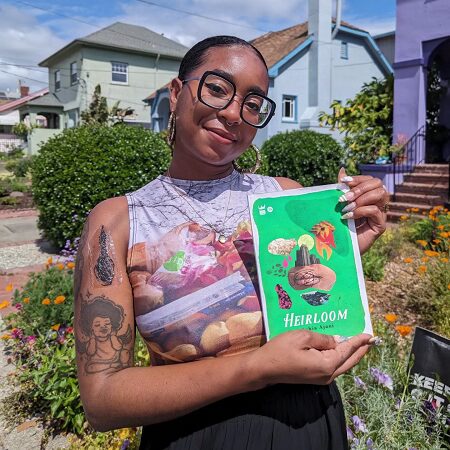perfect plants
and today! i choose to
return to earth’s soft muscle
bend deep, hold warm wetness hereafter
the boi i knew before rigid gender
shook the firmament, rewrote holy
heavens into what could be extracted,
before wretched steel of self rendered
a body hollow, collapsed categories
pulled me down, pra(e)yed to a godlessness
unordained.
today!
i praise the creatures that live
undefined—i plunge my fingers
into the sweet sex of hibiscus
the tender touch of tomato plants
the gentle kiss of soil on jiggling ass
cheeks & thighs, root out relation
small majesties manifest
coming into veritable fruition
i don’t explain, instead i wipe eyes
enveloped in lustful microspores
say look! bits of me disperse
everywhere
After
“And when the earth defends you, you become its lover.”
—Here and Elsewhere (1976)
Sun-spilled. Filled with so much song, even the cicadas paused their chirping to hear the melody of a new world overflow. These songs were how we kept our memories alive, embarrassing as some may have been. Nobody wanted to recall the seed patents, the plastics littering poorly maintained roads, how an extra dollar could afford you another day’s survival. The babies, brown and plentiful, couldn’t remember a time when the earth wasn’t their playground, when the sky burned crimson, when the saguros collapsed from exhaustion. They thought our generation strange: the way we still flinched at the sound of thunder, reminiscent of the bombs and shrapnel launched in the name of progress. How we sometimes ate until our bellies hurt, or searched for our car keys, now obsolete. Occasionally, an elder would pass a body of water and weep, the memory of drought so deeply embedded in their soul. Sometimes, hope is more painful than enduring: but now that we’ve survived, we live our lives at a ship’s helm of our own beginning.
And in the After, folks would tell us this interruption was as short as a hare’s tail, when it really came down to brass tacks. A minor tear in time’s good dress. A terrible dream unraveled by weavers in search of the cross stitch. The storytellers wanted to rewrite the whole endeavor as a trickster’s parable, but the ones who survived held their memories in dog-eared pages. Collapsed, oil-slicked. Grandmother undid her braid and soaked up all that grease, clipping the ends as a testament to what we were leaving behind. Sent the prayer floating down the river, a funeral pyre. We only cut our hair when we are in mourning. So the morning came, illuminated . We watched how beautiful a thing could become when it is returned to origin – again cell, again egg, again portal. Again, lover, palms berry-stained, grasping the future with both hands.
Eventually, America became an afterthought, easily mistaken for the rush of wind that picked up pollen and carried it to other lands. We became other lands, buoyed by our ancestor’s insurgence – how they greened, cracked, crumbled whatever asphalt tried to silence their transformation. Our gritos & gumbo ya yas filling the night sky instead of exhaust. They knew, without a doubt, that even when habitats crumble, some brave creature comes to nest in the ashes.
We met at the crossroads, throwing seeds instead of salt. Let us bloom here, a green insurrection. At the edge of a new world, a figure waits at the mouth of the moon, hips rocking like boats on brackish water. Saddling dusk, she dreams of semi-aquatic guppies inching towards the bowl’s inverted rim.

Ashia Ajani is a sun shower, an overripe nectarine, a carnivorous plant, a glass bead. They are the author of one poetry collection, Heirloom (Write Bloody Publishing, 2023) and a forthcoming collection of lyric essays, Tending the Vines (Timber Press, TBA). Her writing is a kaleidoscope of her work as an eco-griot & abolitionist.